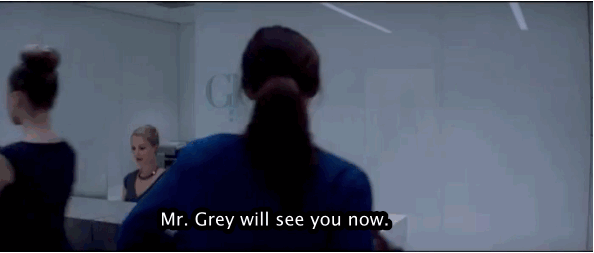The first time I heard about 50 Shades of Grey, the worldwide sensation by British author E.L. James, someone told me it was a Twilight fan fiction. Given my disgust for Twilight, I was going to pass on the opportunity. But my friend in graduate school insisted. She had it on her Kindle and made it only too easy for me to download the app, sign into her account, and read it. Next to the esoteric, long-winded graduate texts I was having to read, 50 Shades of Grey was a breeze. I finished the series in a week, more than two years ago.
Then, I started writing for Slutty Girl Problems and so I took it upon myself to do a comprehensive review of the differences between the book and the movie. I read the book again in a week, but much more carefully. I went into the movie Friday night with the eye of a critical movie reviewer. I read critiques, reviews and article after article about what other people thought about the movie. I talked to friends and got their insights on this new sensation. I thought about ways to start this piece, this piece I’ve promised you all for quite some time, and fashioned at least 5 different ways to start, 5 different directions to go.
I’ve come to this.
I couldn’t simply write a review for a review’s sake. It’s been done. Too many times. To sum it up, the writing quality is horrible (I had to read at least 50-75 pages of the story AGAIN to get over and accept how bad the writing is), the BDSM shown in both the book and the movie is a mere shell of real BDSM (having started practicing BDSM, I know this now), and most disturbingly, the so-called “love” story portrayed in this book is not a love story at all, but abuse.
So, maybe you know on which side of the fence I sit in regards to this story. However, this will not be a review in which I tell off people who find some modicum of enjoyment in the story. I certainly did the first time I read it. And, to be fair, it was reading 50 Shades of Grey that got me curious about the type of sex I like having. It’s not fair to demonize people for enjoying a guilty pleasure… I mean, hell, I watch quite a bit of Keeping Up With the Kardashians in my free time. However, I think there are incredibly important conversations to be had about this story and the themes it emphasizes.
A “Love” Story
But… just in case you have chosen to ignore the hullabaloo, let me fill you in… 50 Shades of Grey is an erotic fiction trilogy centering around college grad Anastasia Steele who falls in with sexy, troubled billionaire Christian Grey who gets off on his “singular tastes”. She’s a virgin, and he’s this experienced rake who induces her into his lifestyle. They fall in love. They can’t be apart. They end up living happily ever after.
Ever the journalist, I went to the 50 Shades showing in my hometown and spoke with a friend who loved the story. Earlier in the week on Facebook, she commented about how 50 Shades of Grey was the best book she’d ever read. Despite wanting to tell her to pick up any number of other books, I found myself at the movies with her and asked her why she liked the story so much.
Her answer epitomizes the cultural phenomenon that is 50 Shades of Grey. “I love how much he loves her,” my friend explained. “And how he was always able to take care of her.”
We have a long history of falling in love with male heroes that love the heroine so much. We love handsome, wealthy male heroes, because somewhere, deep down, we would love to be swept away in a dramatic love story where the hero slays dragons for us whether they’re internal or external. And this is certainly true of Christian Grey… he can buy Anastasia anything she wants and she is ensconced in his fancy, ornate lifestyle.
But what about the love story? The desired theme of the story (and I think the one E.L. James was getting at) is that love can save us. In a sense, she takes the old tropes of the innocent, virginal young woman saving the scarred monster from his past. Indeed, this monster also helps make the innocent young woman feel worthwhile, safe, sexy, beautiful… which is something we can definitively say Anastasia Steele has never felt before.
Unfortunately, the intention of the story gets lost in the details, and we have to ask ourselves if it’s really a story worth telling, given these particular details.
Romantic Heroism in Real Life
I want to offer up a question.
How many of you have ever known an Anastasia Steele before?
Maybe it was you. Maybe it was a friend, a sister, a classmate… maybe you haven’t known one before. Well, if you haven’t, use your imagination and pretend.
Imagine that your best friend is a lot like Anastasia Steele. Maybe she was holding out for some type of romantic hero. She’d never had sex before, despite all your encouragement, despite your set-ups… she was waiting for someone special. Then, say she met that someone.
Say he’s ridiculously good-looking, but your inner creep sensor seems to light up whenever he’s around. Your friend is enamored by him, though. She’s never felt this way about anyone before, so you try to understand, but something feels off.
Then, say she keeps talking to this guy. He buys her extravagant gifts, he surprises her at work or at your apartment or at the club. Then you ask her how he knows where you live, or party, or work – and she says he tracked her cellphone. What would you say?
Or, alternatively, what would you think if, suddenly, your open friend who previously shared everything with you, shut down and wouldn’t talk to you? What if you could tell she was withdrawing into herself? What if you heard her crying at night? What if her emotions see-sawed all over the place whenever he was mentioned or in the room?
Would you think that was normal? Would you think it was romantic?
What if you were with them and she could never eat in front of him? Your best friend, the girl who regularly scarfs down hamburgers and ice cream sundaes, couldn’t eat in front of this man she professes to love. What would you think?
All of us slutty girls know what it’s like when you first lose your virginity, or the glow you get the first time after a great lay. What if you could tell your bestie had that glow, but when pressed for details, she always changed the subject. This is your friend who you’ve always told all the dirty details of your life to, and who’s likewise gushed about the beautiful men you watch on screen. Suddenly, she won’t say a word. What would you think? What would you do?
Realistic Discourse
I bring this up because this kind of discourse is NOT the discourse we’re having about this story. People are quick to jump on either side of the fence, and I would have to say I stand strongly on the Against 50 Shades side. But being strongly on either side of the fence will not change anyone else’s mind, which is why I bring up the visualization aspect.
Domestic abuse is still frighteningly common in this country and in many parts of the world. The rates of domestic abuse among women Anastasia Steele’s age are high. We read Slutty Girl Problems because we know slut shaming reigns supreme. We read Slutty Girl Problems because we know that rape culture is a very real thing, which is why I can’t get behind even reading this story as an escapist fantasy.
I have known too many people who have been in situations like this before and are still traumatized to this day by them.
Christian Grey’s “singular” taste for abusing women is also far too common and is in fact, not singular at all.
But, I also know many people who grew up in abusive households, who have absolutely no abusive bones in their bodies. They don’t get off on hurting other people. They have sought professional help. They are fighting their ghosts still, but they are determined to be better than they’ve been before.
Re-defining Love
Perhaps my biggest issue with the love story aspect of this series is that I’ve always believed that love helps us to be the best version of ourselves. Real love encourages us to change and grow. Sometimes we fight. Sometimes we cry. But we change because WE want to. No individual can change us. Only we can do that.
This is why, when I look at the so-called love story that is 50 Shades of Grey, it doesn’t make me joyful; it makes me sick. The whole time, Christian locks her away in his tower (how’s that for a fairy tale reference?) and frightens her with legal action about a non-disclosure agreement or a contract that is never signed. He stalks her, he coerces her (with words and with alcohol), he grooms her, he makes it nearly impossible for her to leave. And then meanwhile, Anastasia unknowingly enables his behavior, makes excuses for him, changes her plans for him, thinks it’s cute when he’s stalking her or tracking her phone…
In the end of the series, Christian may have become a better person, but what about Anastasia? How did she grow for the better?
Last week, I finished two days in a row crying… about a book. Not because it was over, or because I missed the characters. I cried because we’re packaging this story as a love story when really it should be a lesson about domestic violence. When I finished the movie, I cried because Anastasia’s story is not ‘singular’ or ‘special.’ She was not ‘privileged’ to have it. Anastasia was living an experience that is far too common.
And that terrifies me.
Because we still have such a long way to go. Because domestic abuse is being packaged as love.
I cannot get behind a story that calls itself a love story with a kinky twist, when all I see is all of the women I’ve known and loved, who have faced very similar behavior from men who have said they loved them.
In fact, it occurred to me that if 50 Shades of Grey had ended with Ana leaving Christian and then the rest of the trilogy had delved into details about Ana’s recovery from this experience, that I might have felt differently about it. It might have sent an important message of hope to women going through these kinds of experiences today
Alas, that story has yet to be told.





